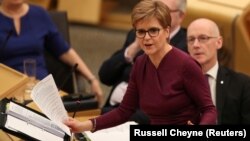The British government has refused a call by Scotland’s First Minister for a special election on Scottish independence.
The refusal came as a note written on the government’s legislative agenda. It said that a new vote would be “damaging.”
British Prime Minister Boris Johnson told Parliament Thursday that the Scottish government should not be concerned with “breaking up our United Kingdom.”
The disagreement came as Queen Elizabeth II arrived at the Parliament in London to set out the policies of Johnson’s new government.
Earlier in the day, First Minister Nicola Sturgeon demanded the British government give Scotland the power to hold a new vote for independence.
In general elections last week, Sturgeon’s Scottish National Party won 80 percent of the seats representing Scotland. She says that majority gives her the right to make the demand.
Speaking in Edinburgh, Sturgeon said the message from the election was that Scotland “does not want a Tory government led by Boris Johnson, taking us out of the European Union (EU)."
Johnson has said the Scottish independence referendum in 2014 settled the question. More than half of those voting wanted to stay part of Britain.
The British will remove Scotland from the EU “against its will,” Sturgeon said.
Scotland had the country’s highest percentage of voters opposed to a British withdrawal from the EU, a move politicians are calling Brexit. Sixty-two percent of the voters want to remain part of the EU.
The Scottish parliament is devolved and needs British permission to hold a new independence referendum. However, Sturgeon said there are still paths to independence.
Legal action
The Scottish parliament was established under British legislation known as the Scotland Act 1998. It says “the Union of the Kingdoms of Scotland and England” is an issue to be decided by Britain’s parliament.
This is understood to mean that any referendum on Scottish independence can only be approved with the permission of lawmakers in London.
However, the issue has never been tested in court. Some lawyers and experts have argued that the Scottish parliament could have the power to call a referendum.
Scotland’s Constitutional Secretary Mike Russell did not rule out such a legal effort, saying “everything is on the table.” But he added that such a move was “not an argument for this week.”
Illegal action
Sturgeon has said she would only seek to separate from the United Kingdom through legal referendum. She is, however, under pressure from some nationalists to call for a vote without the British parliament’s permission.
An unapproved referendum in Scotland could cause a lot of problems, as recent history suggests.
Two years ago, the Spanish state of Catalonia held an independence referendum that led to anger in the country. Spain’s government considered the vote illegal.
Sturgeon’s former adviser, Kevin Pringle, recently wrote that Scotland might hold an illegal referendum.
“The legality…of such a move has never been tested,” he noted in a report in The Sunday Times newspaper.
However, an illegal vote might hurt Scotland’s chances of joining the EU, which most Scots support.
Spain might veto admission by Scotland if its uses an illegal independence process -- fearful that Catalonia might do the same.
I’m Susan Shand.
The Reuters News Agency reported this story. Susan Shand adapted it for VOA Learning English. George Grow was the editor.
Write to us in the Comments Section or on our Facebook page.
_______________________________________________________________
Words in This Story
agenda – n. a list of things to be discussed at a meeting
Tory – n. a member of Britain’s Conservative Party
devolved – adj. becoming less powerful
mandate – n. the power to act that voters give to their elected leaders
on the table – phrase. a thing that is being considered








